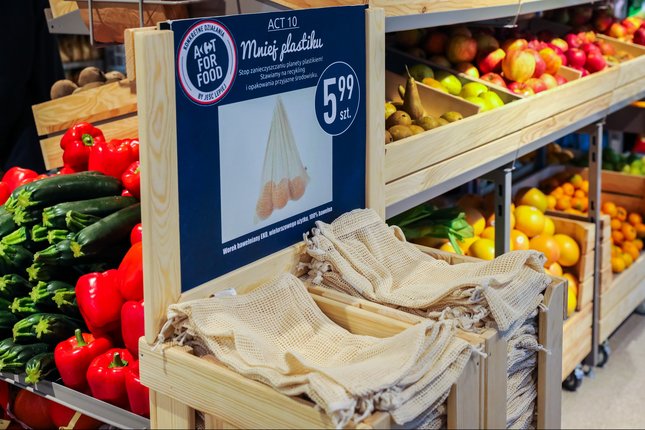French supermarket chains Auchan and Carrefour have introduced reusable cotton bags for weighing fruit and vegetables in their Polish stores, reports Rzeczpospolita. They are among a number of food retail companies introducing innovative solutions in a bid to cut plastic waste.
The bags were tested in 2019, and are now being launched across Poland. Each costing 5.99 zloty, they are made from 100% cotton with a mesh-like texture, designed so that customers can see the products inside (and shop staff can check if the price label matches the contents).
Speaking to the magazine Glamour, Barbara Kowalska, director of quality and sustainable development at Carrefour, said the store was aiming to achieve “a significant reduction in the use of disposable plastic bags”, explaining that this was “a goal that we want to achieve together with customers” to help the planet.
According to Green News, the supermarket is aiming for all own-brand packaging to be compostable or recyclable by 2025. In November last year, the Carrefour network launched Carrefour Bio stores in Poland, where customers can buy organic food from certified suppliers and produced without the use of chemicals. The stores have already proven popular in France, Belgium and Spain.
Carrefour also introduced the option to buy various products by weight and encouraged customers to use their own packaging for purchases. Auchan rolled out the same strategy shortly after – before this, the option could only be used for products sold in its produce department.
As Gazeta Wyborcza notes, 23 January marked the “Day Without Plastic Packaging”, and many supermarkets and restaurant chains have implemented innovative responses to environmental challenges.
Inga Szaniawska of Auchan Polska told the newspaper that: “In 2019, we added ecological substitutes to our range, biodegradable disposable straws and plates that can be thrown into the brown bio waste bin. We have also expanded the range of rubbish bins, adapting the colours of the bins to selective waste sorting.”
Meanwhile, another supermarket chain, Lidl, has introduced new ways of labelling products. Produce in its BIO vegetable range is “tattooed” with information using a non-invasive laser technique, thereby removing the need for packaging. The supermarket stresses that the process is completely safe, and does not affect the structure or nutritional value of the products.
Lidl is also committing to making sure all plastic packaging is recyclable by 2025, forecasting that by that time plastic consumption will be reduced by 20% in unit and multi-packaging of Lidl brand products.
Aleksandra Robaszkiewicz from the Lidl Polska network told Gazeta Wyborcza that in 2019 the supermarket managed to reduce plastic consumption by over 800 tonnes.
“We have achieved this thanks to the reduction of PET material in water bottles, the gradual change in the material used to produce meat and poultry packaging, and the increasing amount of fruit and vegetables that we sell loose,” she explained.
Biedronka, Poland’s largest chain of supermarkets, is also succeeding in its efforts to use less plastic. “In 2018, purchases of plastic bags in our shops were down by around 40% compared to 2017, and in 2019 they fell by another 6%,” Sylwia Krzyżycka from the company told Gazeta Wyborcza.
The chain has also introduced paper bags whose sales support food banks, as well as a reusable “T-shirt”-style bag produced from 80% recycled materials and itself fully recyclable.
Restaurant chains have also been getting in on the act. The Gazeta Wyborcza report notes that from 23 January all McDonald’s outlets would only be using paper straws, ice-cream packaging and balloon sticks.
As we reported last week, the Royal Castle in Warsaw has also been cutting down on waste, by recycling its old advertisement banners as shopping bags and backpacks.
Main image credit: Carrefour





















